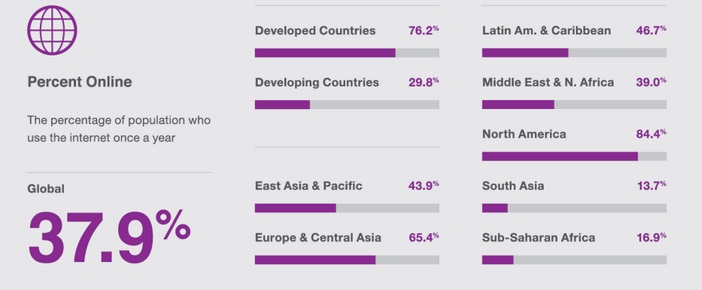Hollywood is barely recovering from the Oscars, one of the biggest online events of the year. In 2014 Twitter and Facebook were abuzz with activity, with the latter reporting some 11.3 million users active discussions during the 2014 ceremony (leading to a grand total of some 25.4 million combined posts, comments, and likes). The former’s service crashed entirely when host Ellen DeGeneres posted a Selfie with a group of leading celebrities.
In 2015 it’s an event tens of millions enjoyed on their smartphones, computers, and possibly even smartwatches. Following in the steps of one of the most luxurious events of the year, however, Facebook led initiative Internet.org released surprising statistics on the state of global internet activity. In their State of Connectivity: 2014 report it has become apparent the majority of the world’s population do not have access to this empowering educational and economical tool.
Whilst many of us take for granted the ease of access we have to the internet, the percentage of the world’s population who use it is only 37.9%. Facebook are now highly proactive in rectifying this massive gulf in global connectivity.
The Issues With The Internet

The internet, in all its glory, has educated, connected, and boosted economies all around the world. This digital era has provided a staggering wealth of information and opportunity to over a billion people, yet the results from Facebook displays those unconnected are, disproportionately, located in developing nations. According to their findings, 78% of the developed world is online, whilst emerging countries are at 32%.
Although internet usage exploded over the last decade, this growth rate has slowed as developed nations effectively max out of active citizens. Facebook stated, “The rate of growth declined for the fourth year in a row to just 6.6% in 2014 (down from 14.7% in 2010). At present rates of decelerating growth, it won’t reach 4 billion people until 2019.”
The message is a stark one – 40% of the world’s population hasn’t connected to the internet even once. Internet.org point out, “Without the cooperation of industry, governments and NGOs working together to improve the global state of connectivity by addressing the underlying reasons people are not connected to the internet, connectivity may remain permanently out of reach for billions of people.”
Facebook claim there are three barriers blocking global internet access, and these need to be addressed before a global campaign can be worked out.
Infrastructure – With 90% of the world’s population in range of a mobile signal, how can can awareness be created to connect people?
Affordability – The true cost of getting people connected – can certain economies afford it?
Relevance – Believe it or not, but some people don’t want to be online or are unaware of the internet. For some, there is limited content in their language. Facebook highlights the need for sufficient content in at least 92 languages to cover 80% of the world’s content needs.
Addressing these and reaching an actionable conclusion is there ultimate goal. They have some enthusiastic ideas on how this can be achieved.
Connecting The World

It’s estimated nearly 3 billion people have access to the internet; whilst this is an enormous figure, it’s barely half of the world’s population. As we know, 40% of the world have never connected to the internet.
Facebook have considered numerous possibilities to this problem in Connecting the World from the Sky. Some of their suggestions involved dramatic concepts such as solar powered drones, satellites, and laser beams. The solar powered option, which appeared one of the more pragmatic, is a high altitude drone. Operating at 65,000ft the crafts would broadcast a signal down to the ground and, whilst cruising at this altitude, they could conserve energy and remain in the air for up to a year.
Google has also taken on the connectivity challenge, throwing their Project Loon and Tango into the experimental mix. As part of their dissemination of a more accessible internet, their concepts are analogous to Facebook’s drone concept, with a format similar to a weather balloon beaming connectivity down to earth.
These concepts appear to be from a Philip K. Dick novel; science-fiction at its finest. The companies are sincere with their proposals, however, and will be pushing onwards enthusiastically in 2015. Whilst a more connected world means an increase in their respective company growth, driving internet access to underprivileged areas of the world could potentially allow millions of people to prosper.
Furthering The Cause

Facebook CEO Mark Zuckerberg will be discussing his plans in depth on 2nd March at a conference in Spain. It can be watched at Mobile World Live. You can find the full State of Connectivity: 2014 report here.
If you’d like to help with the initiative, or find out more, you can contact Internet.org.
This article was syndicated from Business 2 Community: Facebook’s Startling Report On The State Of Global Internet Connectivity
More Digital & Social articles from Business 2 Community:




